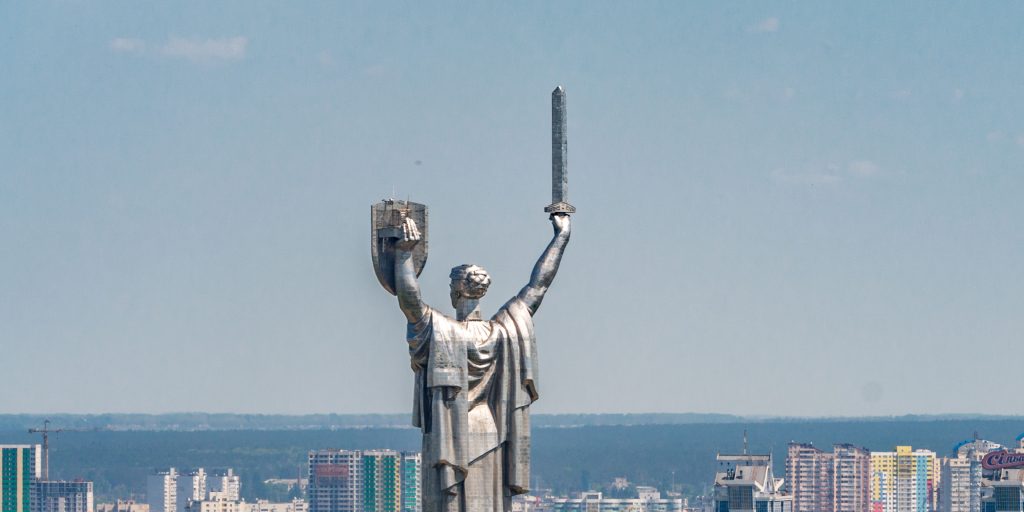
Netflix recently released ‘Munich: The Edge of War’, a film adaptation of Robert Harris’s book. It centres around the Munich agreement, Chamberlain’s attempt to ensure peace in Europe via the negotiation of the Sudetenland in Czechoslovakia. With Vladimir Putin’s Russia waging war on Ukraine, reading this book felt very apt for me, and terrifying. Looking up from the pages to hearing the news at the moment felt like I hadn’t left the world of the book at all.
Europe is facing one of the largest attacks since World War Two, leading to many people referring to the current events as the prelude to world war three. This is not the first recent Russian threat to Ukraine, but it is it’s most unjustified, violent and daring. Missiles and helicopter attacks began on Thursday resulting in numerous casualties and the loss of Ukrainian control in Chernobyl, and Russian Forces now trying to enter the capital, Kyiv. Boris Johnson has said ‘this crisis is about the right of a free , sovereign independent European people to choose their own future. And this is a right that the UK will always defend’. Many countries, including the UK, USA and Japan, are rallying together to ensure peace, placing economic sanctions on Russia.
Some do not think these are enough. They are calling on sanctions against Russia’s use of SWIFT, the Belgium-based system for payments between banks, to hit the economy harder. To put financial pressure on Putin’s regime and Russian Oligarchs instead of on Russia’s economy. The former head of the European council has criticised Germany, France and Italy for blocking a UK request for these tougher sanctions on Russia. Paul Krugman in part blames Europe for the West’s limits of economic sanction, that “the Europeans, unfortunately, have fecklessly allowed themselves to become highly dependent on imports of Russian natural gas” (New York Times) which makes sanctions risky for the country that issues them. Russia controls vast global resources, including about a third of Europe’s natural gas, so the effects of sanctions could have far-reaching consequences. The stock market had plummeted since Putin’s announcement of a “special military operation’ on Ukraine and thousands of its citizens are being forced to flee their homeland or have been injured and killed in the explosions.
In a speech made this past week, Putin announced that he wanted to ‘denazify’ Ukraine by deposing its Jewish leaders. The irony here shows the propaganda and misinformation that forms the basis for Putin’s justifications. Since coming to power in 1999, his circle of advisors has grown ever smaller, creating a bubble of opinion. Initially, NATO was the problem for the Russian President, fearing that the organisation’s inevitable involvement in Ukraine would pose a threat to Russian security. In a survey in February 2021, 56% of people across Ukraine are shown to support the country’s path toward NATO membership (The Conversation). But perhaps, as Hitler initially did, Putin sees a responsibility to Russian speaking people’s outside of Russia’s borders. It’s more of an extremist nationalist issue; Ukraine and Russia have a shared history and have some commonalities and so Putin refuses to recognise Ukraine as an independent state. Some commentators have argued that Putin was never interested in an economic battle, that it is the military success that he has already had, such as the annexation of Crimea in 2014, that has emboldened these attacks on Ukraine. That ‘economies don’t fight wars; militaries do’. It is difficult to negotiate peace if there are no real issues to be negotiated. It is a problem of narrative.
Despite Putin’s claim that he had public support, Russians are voicing their disapproval of Putin’s invasion by scrawling ‘Adolf Putin’ on walls and taking to the streets in protest. Police made more than 1,700 arrests at these anti-war demonstrations mainly in Moscow, and Putin’s home city of St Petersburg.
In the world of sport, teams are wondering if they should withdraw, allying with many countries’ sanctions on Russia. On Friday Formula One announced that it would not be racing there ‘under the current circumstances’ with drivers expressing the concern that ‘it would not be right’ to compete in a country that is committing unnecessary violence. Controversy around sponsorship from Russian Oligarch’s has also arisen.
So is this a repeat of history? Is Putin vying for an unnegotiable, unjustifiable war? If his current rhetoric is anything to go by it certainly feels that way. What began as an issue with NATO intervention has brought about suffering to thousands of Ukrainians and the Russians sent out to fight Putin’s battle. Economic sanctions may be enough, but in a time where inflation is already high and countries are still feeling the impacts of the pandemic, there may be a limit to the sanctions they are willing to risk enforcing. But as the epigraph by F.W. Maitland states in ‘Munich’, ‘we should always be aware that what now lies in the past once lay in the future’. We do not know yet what Putin plans next nor what the response will be.
